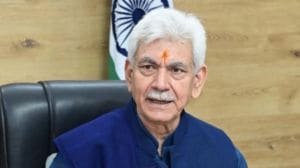Well, well, look what they are stealing in India’s villages now
APRIL 2: Earlier Bhiwandi taluka in Thane district was famous only for power thefts, but now even wells are being stolen. Anyone who finds...

APRIL 2: Earlier Bhiwandi taluka in Thane district was famous only for power thefts, but now even wells are being stolen. Anyone who finds them is requested to please contact Block Development Officer S Gavhale.
— Letter written by Kishan Ghodvinde and 15 other farmers of Shirole village in Bhiwandi taluka, to the Thane Zilla Parishad CEO, N N Shende.
SARCASM and black humour have never been known to have had a cleansing effect on corrupt government officials, but Ghodvinde and his fellow villagers are taking a desperate shot. Sick of waiting for the wells which were supposed to have been dug in their farms under an IRDP scheme — for which money was disbursed — they have, in their letter dated February 29, reported the theft’ of their wells!
As they rue the loss of the money that was supposedly spent on digging the wells in their farms, the only comfort they have is in numbers: they are but just a fraction of the 538 farmers in the three villages of the taluka — Shirole, Ambadi and Jhidki — who have been similarly cheated out of their wells. At the rate of Rs 42,000 per well that the government allocates, this works out to a whopping Rs 2.25 crore of money swindled.
“The zilla parishad claims it has disbursed funds to us for the wells sunk in our fields but the wells are untraceable,” says Bhiru Pawar, a Katkari tribal from Ambadi village who has, at least on paper, been the beneficiary of such an imaginary well. “Since we have no other logical explanation we say that the wells have been stolen,” he expalins.
Pawar’s well was stolen’ using one of the oldest tricks in the babu’s book. In the records the money was shown as disbursed for Pawar, but taking advantage of his illiteracy and unfamiliarity with owning and operating a bank account, the money was siphoned off. And while he is listed as a beneficiary under the scheme, Pawar has no money, no well and works in a brick kiln to make a living because his land lies fallow for want of water. “The money has gone to a non-SC/ST, wealthy farmer and the officials,” he alleges. To compound his misery, the Bhiwandi Panchyat Samiti has asked Pawar pay back the money because he did not dig the well in his farm. Ghodvinde was also relieved of his money in similar fashion. He was hoodwinked into putting his signature on a blank cheque. It was in February 1998 that a sum of Rs 18,000 was withdrawn from his account but there’s still no sign of the well in his farm.
The one common link between the stories of Pawar and Ghodvinde (and many others) is, of course, middlemen such as Ganpat Kaluram Matey.
After Ghodvinde’s application was sanctioned, Matey approached him offering to help out with the bank paperwork for a fee of Rs 500. “He told me the officials would fleece me if I went alone. Anyway, since I can only sign my name when it is needed, I agreed to allow him to prepare all the papers in the panchyat samiti office. After that Matey took me to the Nagari Sahakari Bank where he seemed to know the staff quite well,” recollects Ghodvinde.
Ghodvinde says Matey kept the passbook and cheque book since he was handling the paperwork. A fortnight later when Ghodvinde received no word on the first instalment being received, he enquired at the panchyat samiti office and was stunned to find out that not only was Rs 18,000 released but it was also withdrawn from his account (no. 13654).
Of course, it is not just a case of one middleman duping illeterate tribals for there is official complicity. Once the farmer is duped, the junior engineer, who is supposed to monitor the progress of work for release of the rest of the instalments, fudges records to report work on schedule. No wonder then that the records in the BDO’s office show that 202 (of the 538) wells are fully dug whereas they are just three-feet deep trenches. (In fact, on the second day after this paper started enquiries the diggers were back at Shantaram Patil’s farm in Shirole to dig a well which was abandoned last year.)
The corrpution machine is so well-oiled that, sources say, sharing of spoils is well worked out. At least 50 per cent of the stolen’ wells can be traced back to Matey, who made no bones of his involvement but said: “I planned and executed all this with the full support of the junior engineer B D Waghmare under whom this village falls,” he told this reporter. Not surprisingly, Waghmare has been absconding ever since word about the letter written by villagers to the ZP CEO got around. It was only last year that Waghmare was indicted for showing expenses on a school never built in the same village. But he got away with merely returning the Rs 36,000 supposedly spent because of his connections.
Deputy engineer B B Nilwadkar, Waghmare’s immdiate boss, told this paper: “We have been suspicious about him since the probelm last year and we had reduced his work load but disciplinary action has to come from higher-up.”
Project Director of the department of rural development at the zilla parishad N K Jejurkar said he was hearing of the fraud for the first time but admitted no thorough study of the scheme had been undertaken as to its efficacy. Asked for a list of beneficiaries he said it could “take over a week to prepare,” without explaining why such a list was not at the ready.
District Collector Mukesh Khullar said he had heard of the problem. “The ZP CEO is already seized of the matter and we are asking the ZP to ensure that this work is taken up urgently. Apart from the fact this case needs a specific probe, a detailed investigation with a scope to include all the 15 talukas in the district is needed to find out if such cases are there elsewhere too.”
The scheme
In 1992 the state government launched the “Jeevandhara Million Wells” scheme under the Integrated Rural Development Project to give financial assistance of Rs 23,000 to small SC/ST farmers (land holdings up to two acres) for digging wells in their farms. The amount was raised to Rs 42,000 in 1996. Money was to be disbursed only through cheques and given in three instalments. The scheme closed on March 31.






- 01
- 02
- 03
- 04
- 05

























